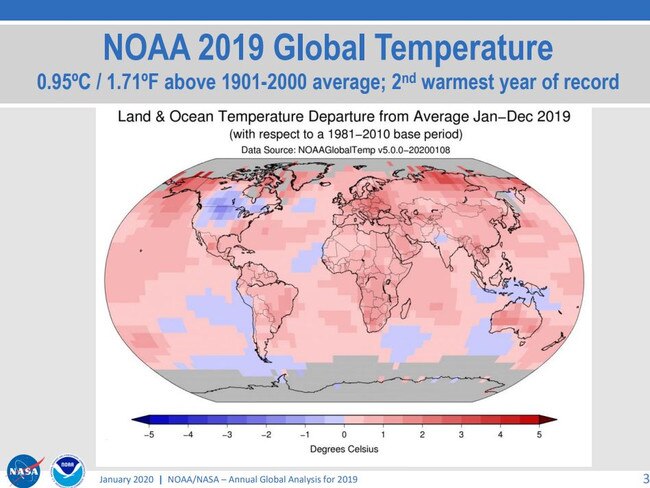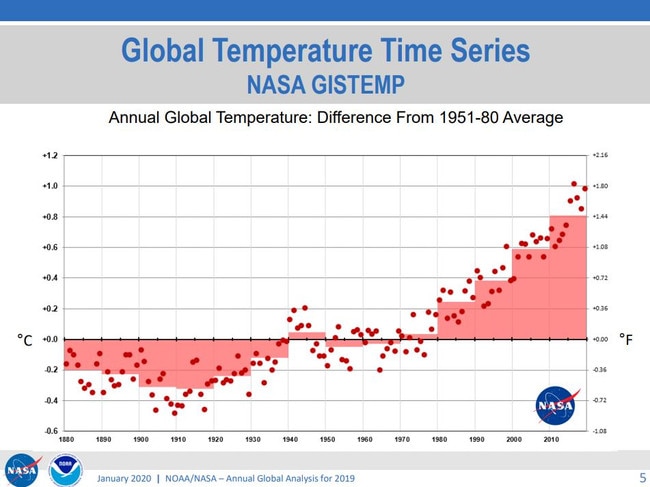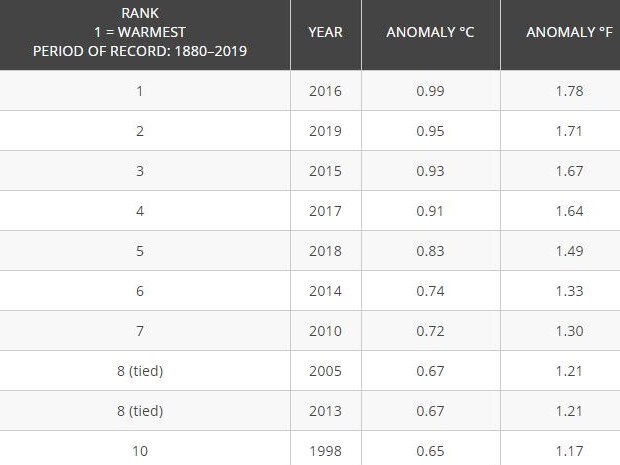2019 was Earth’s second hottest year on record according to NASA
NASA has revealed just how hot the planet is getting and experts say it’s persistent, not a fluke due to a weather phenomenon.
The year 2019 was the second hottest on record for the planet, new data from NASA reveals.
A report released today by NASA and the US National Oceanic and Atmospheric Administration (NOAA), states that global temperatures in 2019 were 0.98 degrees Celsius warmer than the 1951-1980 average.
2016 remains the warmest year on record, but the report has plenty of grim findings about the environmental health of the planet.
“The decade that just ended is clearly the warmest decade on record,” said Dr Gavin Schmidt, director of NASA’s Goddard Institute for Space Studies. “Every decade since the 1960s clearly has been warmer than the one before.”
Dr Schmidt said the increases in global temperatures could now be considered permanent and “we are unlikely to go back”.
“This shows that what’s happening is persistent, not a fluke due to some weather phenomenon: we know that the long-term trends are being driven by the increasing levels of greenhouse gases in the atmosphere,” he said.

NASA’s data is drawn from 20,000 weather stations around the globe on land and sea, including the poles.
Among other findings, the report showed 2019 was the second warmest year on record for Europe and South America, and the third warmest on record for Asia and Africa.
The NASA/NOAA report follows last week’s climate statement from Australia’s Bureau of Meteorology, which showed 2019 was both our hottest and driest year since records began.
The authors of the NASA/NOAA report stated that the five warmest years globally since 1880 have all occurred since 2015, while nine of the 10 warmest years have occurred since 2005.
The year just gone marked the 43rd consecutive year that global land and ocean temperatures were at least nominally above the 20th century average, they said.
The report also showed that temperatures in North America, while warm on average, were not nearly as warm as elsewhere during 2019.
2019 was North America’s 14th warmest on record, while for the 48 contiguous states (that is, all states except Hawaii and Alaska), it was the 34th warmest year out of 126 years of available data.
Alaska experienced its warmest year ever.
There were 14 extreme weather events with losses exceeding $US1 billion in the US in 2019, according to the report: three floods, eight severe storms, two tropical cyclones and the California wildfires.

Despite the comparative “mildness” of the US results, Bruce Wolpe, a senior fellow at the United States Studies Centre, said it would not likely dampen calls for action on climate change in the US.
“Many Americans, politicians in Washington, and the Democratic presidential candidates are paying enormous attention to climate change – witness the references to Australia in the Iowa Democratic candidates’ debate,” he said.
“The front page newspaper and TV news coverage of the Australian bushfires is unprecedented – and on par with coverage of fires in California. I believe this reflects a mature sense that global warming is a global issue, and that localised differentiation does not detract from the growing sense of urgency to address it.”
With regard to the polar ice caps, which grow and shrink on a seasonal basis, the NASA/NOAA report found that the Arctic had its seventh smallest maximum, and its second smallest minimum.
The Antarctic ice pack was slightly below average at its maximum, and had its seventh smallest minimum, the report found.

Originally published as 2019 was Earth’s second hottest year on record according to NASA
